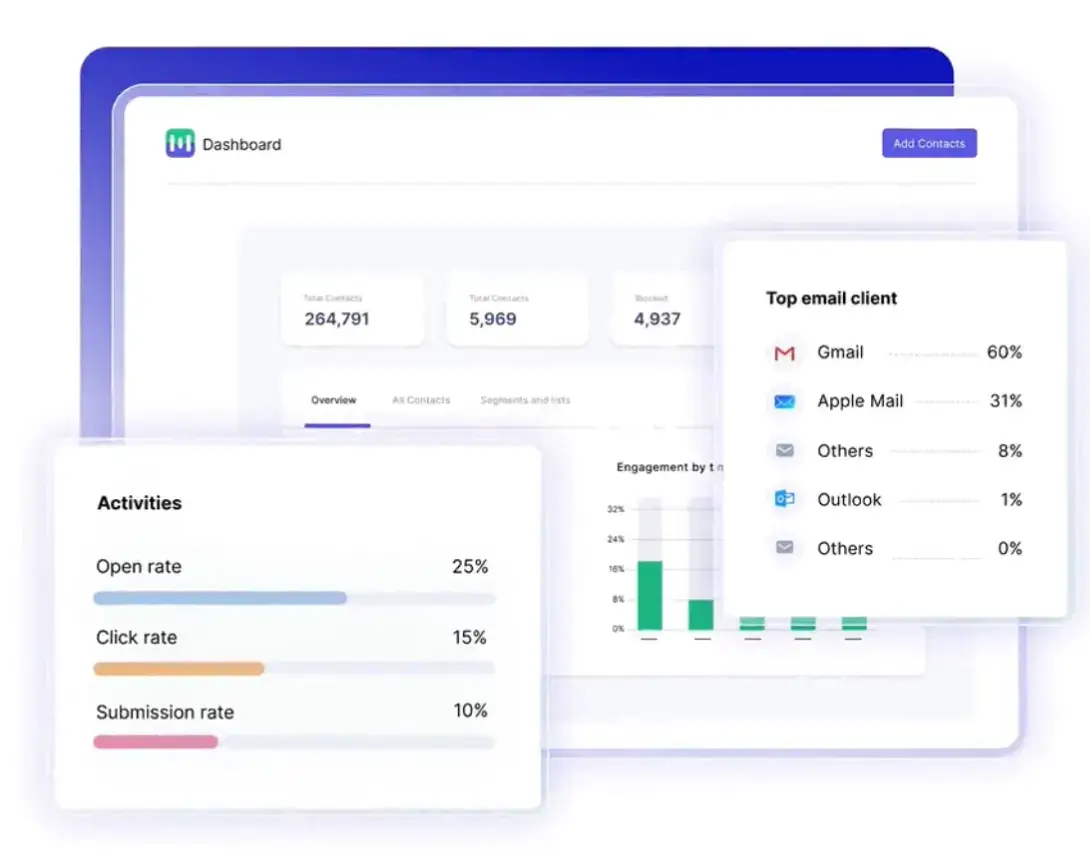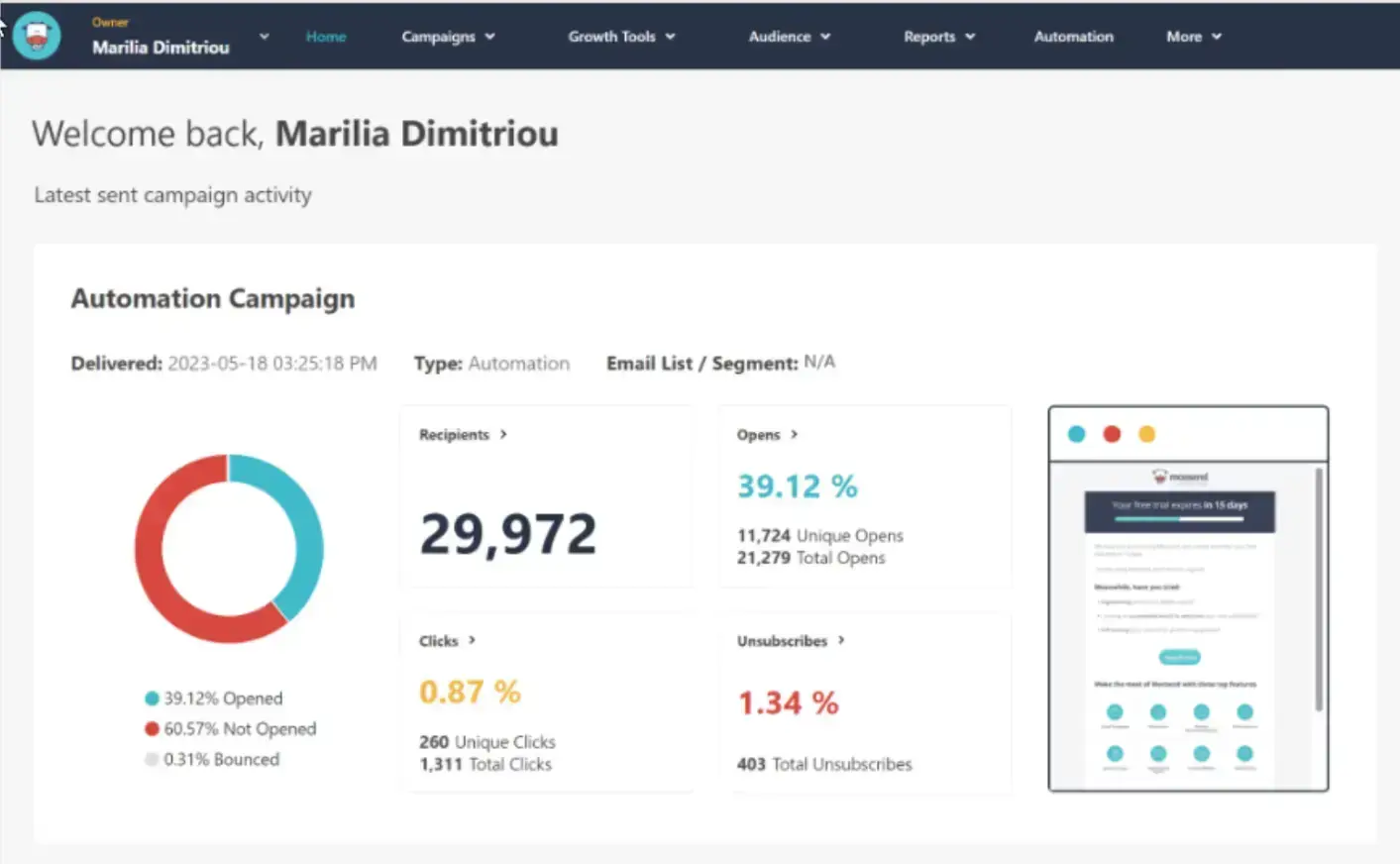Email marketing is not dead. In 2025, email marketing will become easier and better due to platforms that offer advanced features such as email automation, segmentation, analytics, and personalization.
*Updated 12/24/2024
The rise of other digital marketing channels has raised concerns that email marketing might be losing its effectiveness.
Email marketing strategies may also face challenges due to concerns like data privacy, regulations like GDPR (General Data Privacy Regulation), inbox overload, and the chances of being marked as spam.
Article Shortcuts:
- Why Should You Use Email Marketing as a Small Business Owner?
- Top 8 Email Marketing Software Platforms for a Small Business
- How to Pick the Right Email Marketing Software Platform for Your Business
Email marketing software platforms have evolved to address these challenges and continue to roll out features that increase the effectiveness of email marketing.
If you are wondering about the value of email marketing software platforms in 2024, this article will dispel all your doubts and also provide you with the best options.

Source: Pexels
Why Should You Use Email Marketing as a Small Business Owner?
Small business owners need to capitalize on the benefits of email marketing.
Email marketing offers several marked benefits over other marketing channels. Some of these benefits are highlighted below:
-
The reach
Email is still one of the most widely used forms of communication globally. As of 2022, the number of daily email users was around 4.26 billion, which is more than half the world population.
The number of users is set to grow to 4.73 billion by 2026. Every single day, worldwide, about 306 billion emails are sent and received.

Source: Freepik
-
Cost-effectiveness and high ROI
A marketing channel that offers the dual advantage of low expenses and great returns is a winning investment. On average, email marketing generates around $36 for every dollar spent.
Email marketing campaigns also require less time, effort, and expertise than other marketing channels and planning. Especially with the advances in email marketing software platforms, email marketing requires even fewer resources and is better positioned to produce desired results.
-
Better targeting
Email marketing helps reach the right people at the right time, which is vital for businesses. Moreover, it allows direct communication, which leads to higher engagement.
Additionally, due to the segmentation and personalization capabilities of email marketing software platforms, the email marketing approach has increased in effectiveness and relevance.
This typically leads to higher response rates and conversions. With email marketing done right, you can ensure that your small business stays at the top of the minds of your target customers.
-
Control and ownership of contact list and media
The marketing channel, touted as the biggest competitor of email marketing, is social media marketing and has some serious yet often overlooked disadvantages.
The social media platform owns all the content you post on your social media account and your contact list. With the platform's downfall or removal of your account, you stand the risk of losing all your content and the customer base you’ve built there.
In contrast, the email list you create and the content you send via emails will remain yours.
Plus, using an email verifier helps ensure your list stays clean and valid, improving deliverability and protecting your direct line to customers.
Considering the sheer size of the internet, having a powerful tool like web scraping JavaScript can make building your contact list much easier.
Web scraping is the process of siphoning off information present on various websites on the internet for use.
If your small business needs more control over the contact information of your users, both current and potential, it’s essential to use a powerful scraping tool like Javascript, which is known for its versatility in the domain of web development.
To make your scraping efforts even more effective and anonymous, using a free online proxy can help you bypass restrictions and protect your IP while collecting data at scale.
Since it has multiple uses in the domain, it’s far more easy to scrape the web using this language, as compared to its counterparts.
Apart from the above, email marketing also offers these advantages:
- Real-time tracking of email marketing campaigns via the analytics and reporting features of software platforms
- Scalable campaigns based on predefined triggers and workflows
- More meaningful connection with customers through personalized content, growth of relationships, and boost in customer loyalty
- Helps keep a pulse on the experience of customers and opens opportunities for refining products and services based on feedback
- Carefully crafted emails have the power to drive traffic to the business website
- Email marketing helps nurture leads and increase the number of qualified leads
- The customers have the choice to opt in, and businesses have an avenue for self-promotion and increasing brand awareness
The mix of marketing channels you use will depend on the needs of your small business.
Ideally, you should neither rely solely on email marketing nor leave it out of the mix of marketing channels you use. Utilize email marketing to expand your customer base and grow your business.
Even if your business is small, create your own email domain. This demonstrates professionalism and increases trust in your brand. Use a custom email domain to reinforce your brand identity.
Most email marketing software platforms allow you to use a custom email domain for sending the best marketing emails, but you will have to verify the ownership through the methods suggested by the platform.
Read on to learn more about some of the best email marketing software platforms available today. The following list does not reflect any order of significance or priority; it just includes some of the best platforms out there.
Top 8 Email Marketing Software Platforms for a Small Business

Source: Unsplash
- MailModo
- Drip
- Zoho Campaigns
- GoZen Growth
- Mailer Lite
- Moosend
- Campaigner
- Brevo
1. Mailmodo
With Mailmodo, you can go beyond traditional static emails and turn emails into experiences. This outreach software will help you create engaging interactive elements to drive conversions.
Mailmodo enables audience segmentation and highly targeted email marketing campaigns. You can tailor the user journey depending on how the user interacts with your emails.
The interface is intuitive, seamless, and modern. Setup is quick and easy, and onboarding is free. This platform allows you to create, automate, and send AMP and HTML emails. Mailmodo also offers analytical features that you can use to measure the effectiveness of your campaigns and make data-driven decisions.

2. Drip
Drip is a great option for e-commerce businesses. It offers several advanced e-commerce-specific features.
With Drip, you can automate marketing actions based on e-commerce behaviors. For instance, you can encourage purchases with automated abandoned cart reminders.
Drip also allows integration with the big players in the e-commerce arena, such as Shopify, and also with tools for CRM, lead generation, analytics, data management, and more.
Although there is no free version, you can get a feel of the features with the 14-day trial.
3. Zoho Campaigns
Zoho offers quite a comprehensive software suite at competitive prices, and Zoho Campaigns is just one of them. Although it is great as a standalone email marketing software, Zoho Campaigns allows convenient integration with tools like Zoho CRM.
You can design dynamic and personalized emails with the drag-and-drop editor of this email marketing software. The reply tracking feature allows you to create unique workflow paths based on recipient responses.
Zoho Campaigns also allows you to test the effectiveness of your email marketing campaigns in real-time and thereby takes the guesswork out of the equation. The only downside is that it can get expensive quite fast, but it is worth considering since it is rich on the feature front.
4. GoZen Growth
GoZen Growth is a great option for those wanting to do email marketing and cold outreach. It is one of the best email marketing automation for B2B eCommerce solutions and other B2C companies.
GoZen Growth comes with pre-built workflows, such as welcome email sequences, cart abandonment, post-purchase follow-ups, onboarding, and prelaunch sequences to make the automation process seamless and efficient for users.
The unique thing about Growth is that it has a multi-channel marketing option called push notification that allows you to reach your audience via website and Android devices apart from the email channel.
This tool also has built-in forms, which can be used for lead generation and data collection. It allows integration with the big players in the e-commerce arena, such as Shopify and WooCommerce, and also with tools for CRM, lead generation, analytics, data management, and more.
5. MailerLite
This affordable email solution is suitable for any type of business. Whether you want to sell digital downloads or integrate with your e-commerce store, MailerLite has you covered.
You can also look for a Mailerlite alternative that offers even more features without breaking the bank.
You can also use it to build your website or blog and monetize your content. The platform offers a free plan for up to 1000 subscribers with 12000 monthly emails.
The paid plans are quite competitively priced, starting with the Growing Business Plan at $9 per month. It’s a user-friendly platform with a very small learning curve.
6. Moosend
Although Moosend is the email platform behind big brands such as Vogue and TEDx, it’s also a budget-friendly option for small businesses. It has scalable pricing plans to accommodate the needs of companies of all sizes.

Source: Moosend
Moosend offers everything you need for your email marketing campaigns, such as a drag-and-drop editor, scheduling options, and shopper behavior tracking. This platform does not provide a website builder but integrates seamlessly with third-party platforms and tools, including website builders.
Moosend’s interface is designed so that users can easily navigate through its various features and functionalities, making it a suitable platform for anyone just starting out with email marketing.
7. Campaigner
Campaigner offers over 60 advanced email marketing features for SMEs (Small and Medium Enterprises), including email automation workflows, API access, SMTP relay services, and A/B split testing. Campaigner also has features that ensure compliance with email marketing regulations, such as CAN-SPAM.
The platform's variety of templates enables the creation of responsive emails. It also allows personalization of any aspect of emails based on criteria such as engagement, purchase history, and demographics.
Although there is no free plan, it does offer a 30-day free trial. Its elaborate features make it a suitable choice for email marketing experts.
8. Brevo
Brevo (formerly Sendinblue) is a popular marketing platform that offers various features for managing email campaigns, such as customizable templates, drag and drop editor, send time optimization, segmentation of email lists, analytics and reporting, and A/B testing.
Brevo offers unlimited contacts and advanced segmentation on all plans. The free version limits users to 300 emails per day. Brevo recommends the Starter plan for small and growing businesses, which starts at $25 per month. In addition to email marketing, Brevo can create SMS campaigns.
How to Pick the Right Email Marketing Software Platform for Your Business
The email marketing software you pick will greatly impact the effectiveness of your email marketing campaigns. It’s an important choice, and there are several factors you need to consider, such as these:
-
The needs of your business
All email marketing tools allow you to create and send emails. You must determine your business's specific email marketing needs.
What does your business currently need for the effective management of email campaigns? Create a list of criteria based on your goals and requirements. Then, use this list to narrow down your options.
-
Features of the platform
Check the features that a platform provides against your list of criteria you’ve created. If it offers all the features your business requires, it’s an option worth considering.
On the other hand, if it’s lacking essential features, eliminate it from your shortlist. If the platform offers a free trial period, use this to test out the features.
-
Transition
The platform should support a seamless transition from your current platform or system. There should be minimal disruption, if any, to your email marketing operations.
Transition to the platform should not cause data loss, corruption, or destructive inconsistencies. The platform should have a small learning curve so that you can make the switch quickly and easily.
-
Reviews and reputation
Reviews will tell you what the platform website won’t.
Use the reviews online to gauge whether the platform delivers on its promises. Reviews will reveal much about the technical issues that other users have faced, such as downtime, customer support responsiveness, valuable features, and ease of use.
Through reviews, you can identify the strengths and weaknesses of the shortlisted platforms. Use this information for a comparative analysis and make an informed decision.
-
Pricing
Evaluate the shortlisted platforms against your email marketing campaign budget. You need a platform that fits within your financial constraints and provides the best value.
Avoid platforms or plans that have several features that your business does not currently need, as opting for these may unnecessarily increase your costs. Scrutinize the pricing plans for hidden costs, such as extra charges for exceeding usage limits.
Choose a platform that aligns with your budget and requirements.
-
Future growth
With successful marketing campaigns and smart moves, your business is bound to grow. Does the platform have the ability to accommodate your business's growing needs?
You shouldn’t have to worry about performance degradation or require a costly migration to a new platform anytime soon. Also, check whether the platform can adapt to the rapidly evolving market without disruption.
Increase the Effectiveness of Your Email Marketing Campaigns
Pick the email solution most suitable for the needs of your growing business. It’s not just another tool in your marketing arsenal; it is the tool that will make a significant difference, especially for a small business.
With a versatile email marketing platform, you can increase customer engagement, drive conversions, and improve the overall effectiveness of your email marketing campaigns.
Author Bio
Nick Thomson is a Community Outreach Manager at Acuity Training, a multi award-winning training business offering in-person and online courses. Acuity Training provides training courses for popular business software including Microsoft (Excel, Power BI, Project, etc), Adobe, AutoCAD, and SQL, and soft skills and management training (team leader, line management, time management, etc).


